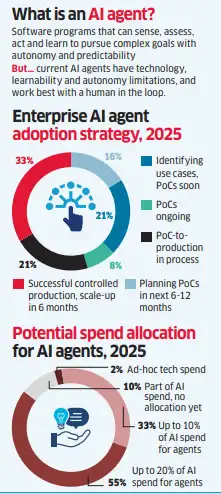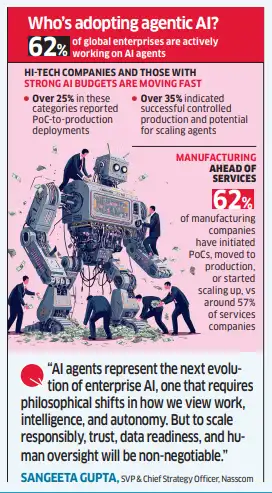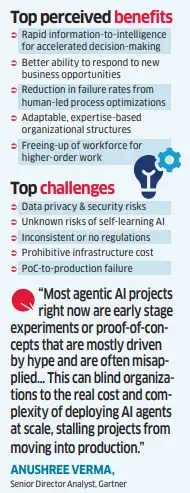AI agents gain traction but face high failure risks
AI agents are emerging as the next big trend after Generative AI, with 62% of enterprises testing them for task automation. However, Gartner predicts 40% of projects may fail by 2027 due to low maturity and execution challenges.

AI agents have emerged as the "next big thing" in the tech world, following the hype around Generative AI. Unlike language models that generate text or analyze data, AI agents can autonomously execute tasks, marking a significant shift in capabilities.
Current Adoption Trends
- 62% of global enterprises are experimenting with AI agents, ranging from proof-of-concepts (PoCs) to scaled pilots (source).
- Most deployments are internal, focusing on task-level automation with human oversight.

Challenges and Risks
Despite growing interest, the technology faces significant hurdles:
- Low maturity: Many use cases are still in early stages.
- High failure rate: Gartner predicts 40% of agentic AI projects will be discontinued by 2027.

Key Benefits
Enterprises are drawn to AI agents for their potential to:
- Automate repetitive tasks
- Improve operational efficiency
- Reduce human error

The Road Ahead
While AI agents show promise, the technology needs to overcome:
- Execution challenges
- Integration complexities
- Proving ROI beyond pilot stages
The coming years will determine whether AI agents become mainstream tools or join the list of overhyped technologies that failed to deliver on their initial promise.
Related News
AWS extends Bedrock AgentCore Gateway to unify MCP servers for AI agents
AWS announces expanded Amazon Bedrock AgentCore Gateway support for MCP servers, enabling centralized management of AI agent tools across organizations.
Jagged AI Already Disrupting Jobs Despite AGI Remaining Distant
Enterprise AI adoption focuses on real-world returns with 'jagged' systems, driving productivity gains but leading to white-collar job cuts across industries.
About the Author

Michael Rodriguez
AI Technology Journalist
Veteran technology journalist with 12 years of focus on AI industry reporting. Former AI section editor at TechCrunch, now freelance writer contributing in-depth AI industry analysis to renowned media outlets like Wired and The Verge. Has keen insights into AI startups and emerging technology trends.